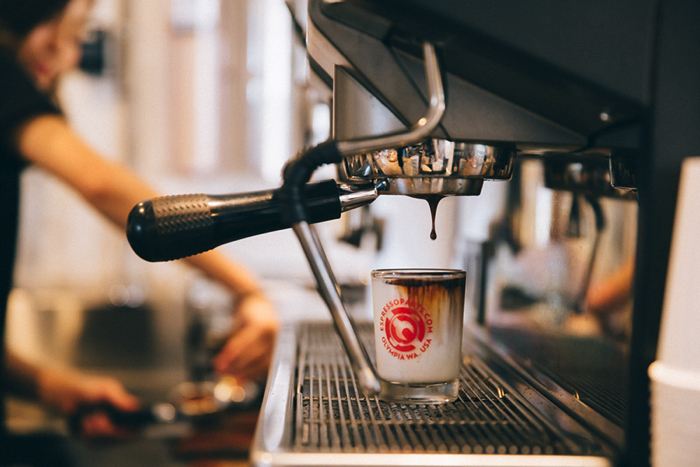Special article | Coffee culture in mainland China Taiwan is an important driving force

Taipei and Shanghai are representatives of commercial cities on both sides of the strait, and the characteristics of these two cities are specifically and slightly reflected in their cafe culture.
Regardless of common chain stores such as Starbucks, cafes in Shanghai have a cup of 60 to 80 yuan (about NT $270 to 360). But there are always full Japanese cafes, reserved cafes hidden in old houses, cafes that blend traditional "Shikumen" architecture and trendy decoration, and on roads with many foreign guests and rich literary and artistic tastes. it makes people think that it's in the streets of Europe.
"petty bourgeoisie sentiment" is one of the most appropriate descriptions of these cafes. On the whole, Shanghai cafes are "not afraid of being expensive but not distinctive." Wu Bingze, a Taiwanese photographer who owns a coffee shop in Shanghai, observes that Shanghai guests like to visit the shop, like to taste fresh, and enjoy going to several cafes, and the boss is relatively under pressure to provide new products or services.
The independent cafes in Taipei do not seem to be as flamboyant, exciting or high-profile as Shanghai, but like this city, they are "able to stroll" and the alleys are full of surprises and can withstand careful taste. The British Broadcasting Corporation (BBC) has selected Taipei as one of the six best coffee cities in the world. The other five are Melbourne, Australia, Havana, Cuba, Vienna, Austria, Seattle of the United States and Rome, Italy. This shows the splendor and popularity of coffee culture in Taipei.
Taiwanese play a promoting role in mainland coffee culture
The cafes in Taiwan and Shanghai have their own advantages, but the cafe culture of Chinese mainland is mainly driven by Taiwanese.
Wang Xiaofeng, the owner of Moon Coffee, who is well-known in the professional coffee circle in Shanghai, told reporters that over the past few years, he has known that Taiwan has a good source of raw beans, and he also feels that Taiwan's coffee industry is highly mature. If he goes to Taiwan in the future, he would like to see the operation of boutique cafes here and communicate with the roasters here.
Before starting a business, Wang Xiaofeng was a barista at the "quality shop" of the Shanghai Cafe. She and several colleagues talked about receiving the training of Huang Junhao, a Taiwanese, who was the head of the "quality shop" at that time. She loved to talk about it and missed it very much.
Zheng Songmao, the founder of the quality Pavilion, is from Taiwan and was the chairman of the ideological advertising company. In the 1980s, the idea of "the cat fainted on the piano" was hotly discussed in the Stima chewing gum advertisement, and it is still a classic. In 2011, Zheng Songmao opened a "quality hall" in Shanghai and created the position of "coffee manager". Baristas trained over the years have been on their own in Shanghai and the surrounding cities.
Due to its excellent performance in the World Cup coffee competition, including the 2016 World Cup coffee master champion Wu Zelin, Taiwan has won the top three in bean baking, cup testing and brewing competitions in recent years. For mainlanders who want to enter the coffee field, Taiwan's coffee industry represents a better coffee technology and a more mature stage of development.
Baristas not only work, but also give people dignity and confidence.
In the eyes of many mainland baristas, Hu Yuanzheng, who is the referee of many coffee competitions in the World Cup, Lim Dong-Won, who is known as the "prince of coffee flowers," and Huang Junhao, who once served as the first coffee director of the "quality store." they are all quite powerful and respectable coffee professionals in Taiwan.
They have their own cafes, coffee companies or coffee training institutions on Chinese mainland, and constantly spread their influence through professional itinerant lectures.
Taiwanese have a wide coffee business in Chinese mainland. As early as 1997, Shangdao Coffee entered Chinese mainland, introducing the "coffee plus western food" business model. In addition to cafes, Taiwanese businessmen also open bean baking factories and import raw beans. Wang Li Coffee, which entered Chinese mainland in 2003, not only sells equipment and imported boutique coffee beans, but also provides guidance on opening a store.
The influence of Taiwanese on the mainland coffee industry lies not only in the introduction of "how to make a good cup of coffee," but also in the cultivation of talents and the spread of their way of life.
Zheng Songmao says that many young people who come to be baristas are not highly educated, but through training, they can professionally serve customers at the boss level and even introduce what kind of coffee they should drink. "baristas are not just a job." it also gives them dignity and self-confidence.
The salary of baristas in Chinese mainland is still on the low side, so the quality Restaurant updated the system, setting baristas as a three-tier system with salaries of 4800 yuan, 5800 yuan and 8800 yuan respectively, to encourage employees to upgrade through training and exams, but no one has yet reached the highest level.
The coffee culture in Shanghai is the most prosperous. Beijing is relatively reserved.
It has been more than 30 years since the reform and opening up of the Chinese mainland in the 1980s. Although "drinking coffee", a Western thing, has not been introduced recently, it is indeed after the reform and opening up that it needs to be commercialized and developed on a large scale.
Different cities have different coffee cultures. Shanghai is the most prosperous place for the culture of Chinese mainland cafes, mainly because there are many foreigners in Shanghai, it has always been a major commercial city, and many important coffee competitions are held here.
As for Beijing, which is known as the "imperial capital", the culture of drinking coffee is still more formal, still dominated by chain cafes. Xiao Tang, barista of Moon Coffee, said that many Shanghai coffee circle operators are connected to each other, and coffee workers in Beijing are surprised by the atmosphere of "unity" and sharing.
In some third-and fourth-tier cities, the cafe culture is still weak. "A lot of people just want to find a place to play cards, so they go to coffee shops," said Ye Lei, a bean baker who once worked in Wuhu, Anhui province. More people are willing to drink tea and resist coffee.
Fan Lei, author of the official Wechat account "Map of Independent Cafe of China", who has been working on coffee for 10 years, told reporters that in addition to Shanghai, coffee culture is also booming in Xiamen, Guangzhou, Nanjing, Qingdao and Wuhan.
She said that the wave of boutique coffee entering Chinese mainland in the past three years is surging, mainly because coffee-related world coffee competitions have covered more than 20 cities. In addition to promoting the development of the industry, the competition can also prove that "Chinese coffee is delicious."
The so-called boutique coffee, in the narrow sense, refers to the coffee beans scored more than 80 points by the International Coffee quality Identification Association (CQI). In the broad sense, it also includes the requirements of baking, brewing technology, service and so on. However, many people in the industry have criticized that "boutique coffee" in Chinese mainland is often reduced to an adjective rather than a strictly defined noun.
High housing prices stifle the dream of opening a shop, cafes switch frequently.
Fan Lei says that at present, coffee consumers in mainland cities, mainly white-collar workers with moderate economic ability, "have small demands on life" and want a diversified taste of life, and the number of such people is increasing.
However, high rents have become a nightmare for cafes in big cities such as Shanghai. In the two years since Fan Lei wrote the Map of Independent Cafe in China, some cafes have closed because the landlord repossessed the house.
The "quality Museum" is located in a small branch of about 3 ping in the city, with a monthly rent of nearly 50, 000 yuan (about NT $225000).
In addition to the high rent, obtaining a legal business license is also a pain for many young people from the mainland who dream of coffee. Although Taiwan also has regulations on the qualifications to open a store, things are more complicated on Chinese mainland.
When coffee workers in Taiwan talk about the ideal of opening a shop and assess whether it can achieve operational benefits, interviewees on the mainland always worry that "it depends on whether the government supports the industry." after all, last year a row of bars on Yongkang Road in Shanghai were torn down under the strong law enforcement of the government.
They said that fire protection and other laws and regulations are too strict, many ready-made houses do not meet the business regulations, and the prices of legal stores along the main roads in Shanghai have skyrocketed. Some independent cafes actually do not have business licenses, and neighbors are aware of the situation. At this time, it is very important to "establish a good relationship" with these neighbors. However, for those who simply want to make good coffee and share interaction with their guests, this is actually invisible pressure.
"go to the cafe" Taiwan is used to the mainland is fashionable
Compared with Chinese mainland, cafes in Taiwan developed earlier, accepted the Western coffee-drinking culture from Japan during the Japanese occupation, and gradually emerged from their own characteristics.
Lim Dong-Won, once Taiwan's first coffee champion, has been in the industry for more than 20 years. At first, he said, he was a little skeptical about his technology or taste. after all, coffee is a long tradition in Europe and the United States, and they may be more authoritative.
However, after traveling across five continents, he found that "Taiwan's coffee technology is among the best in the world." it's just that drinking coffee is not like life in Europe and the United States, and the consumption is not high. He thinks that people working in Taiwan's coffee industry are relatively hard.
Taiwan's excellent performance in coffee technology affects not only Chinese mainland, but also Southeast Asian countries.
Since 2005, Lim Dong-Won has been invited to perform coffee brewing and flower drawing in Thailand, Vietnam, Malaysia, Singapore, Hong Kong and Chinese mainland, or to serve as the judge of coffee competitions. He said that in the eyes of the people of Southeast Asian countries, Taiwan is the most advanced place in Asian countries with the most advanced coffee culture except Japan. Coupled with the fact that there are many Chinese in these countries, they are more willing to interact with baristas in Taiwan.
With regard to the similarities and differences of coffee culture between the two sides of the strait, according to Lim Dong-Won 's observation, the coffee shop culture in Shanghai is the closest to that in Taiwan. On the whole, many mainlanders regard "going to coffee shops" as a fashion, unlike Taiwanese who are used to using cafes as places for rest and interaction.
Proportionally, Taiwan may have more "expert" consumers who know how to judge, but in terms of consumption, Shanghai customers have shown considerable strength. Zheng Songmao takes his own coffee shop as an example. In terms of the number of cups sold, 30% is fine coffee and 70% is traditional Italian coffee.
According to media reports, Chinese mainland consumes only four cups of coffee a year, while Beijing, Shanghai and Guangzhou sell 20 cups a year, compared with 100cups in Taiwan, 343cups in Japan and 412cups in the United States. Although the shadow of high rent still exists, the coffee industry of Chinese mainland as a whole still has a lot of room for development and has the potential to become the largest coffee market in the world.
Important Notice :
前街咖啡 FrontStreet Coffee has moved to new addredd:
FrontStreet Coffee Address: 315,Donghua East Road,GuangZhou
Tel:020 38364473
- Prev

Tea, coffee, drink water, be careful. Thirsty.
Drinking plenty of water is good for your health. Is tea and coffee water? Nutritionists said that drinks can not completely replace water, especially tea, coffee, alcoholic beverages have diuretic effect, exercise, kidney stones, gout and labor workload, need more boiled water to make up, develop the habit of pure drinking water, in order to achieve water balance. The daily water requirement of the human body is calculated by drinking per kilogram of body.
- Next

Ideas can be used in this way! 3D printing cross-border play to create customized face coffee
The latest 3D printing technology is also used in coffee flowers. As long as you take a picture with a tablet and transfer it to a special machine, you can have a unique customized photo coffee. The pattern printed on the foam is exactly the same as the photo, and you can make a special coffee flower without long manual practice. 3D printing creativity cross-border to create a customized face coffee ID-881
Related
- Workers collapse! Lucky suspects that it will introduce freshly cut fruits?!
- 1-point subsidy recipients wear thousand-yuan watches?! Local response: For low-income households
- Can lightly roasted coffee beans be used to extract espresso? How finely should you grind high-quality coffee beans to make Italian latte?
- What is the difference between the world's top rose summer coffee and Yejia Shefi? What are the flavor characteristics of Yega Shefi coffee and Panama rose summer?
- The ceremony is full! Starbucks starts to cut the ribbon at a complimentary coffee station?!
- A whole Michelin meal?! Lucky launches the new "Small Butter Apple Crispy Latte"
- Three tips for adjusting espresso on rainy days! Quickly find the right water temperature, powder, and grinding ratio for espresso!
- How much hot water does it take to brew hanging ear coffee? How does it taste best? Can hot water from the water dispenser be used to make ear drip coffee?
- What grade does Jamaica Blue Mountain No. 1 coffee belong to and how to drink it better? What is the highest grade of Blue Mountain coffee for coffee aristocrats?
- What are the flavor characteristics of the world-famous coffee Blue Mountain No. 1 Golden Mantelin? What are the characteristics of deep-roasted bitter coffee?

